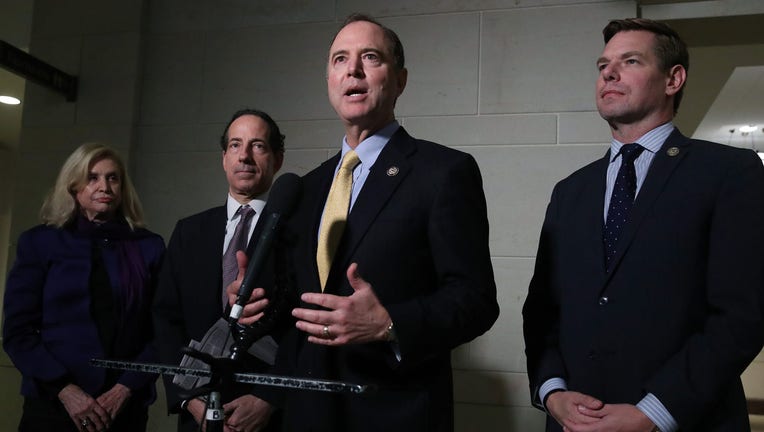Dems introduce resolution formalizing impeachment inquiry procedures

WASHINGTON, DC - OCTOBER 28: U.S. House Intelligence Committee Chairman Rep. Adam Schiff (D-CA) speaks to members of the media outside a closed session before the House Intelligence, Foreign Affairs and Oversight committees at the U.S. Capitol on Oct
WASHINGTON - House Democrats on Tuesday introduced a resolution to formalize their impeachment inquiry and adopt rules to govern the proceedings, following sustained complaints by Republicans in Congress and the White House that the secretive inquiry hasn't followed past precedent and violates the president's due process rights.
But, illustrating the tight balancing act involved as the 2020 election cycle gets started, Democrats have adamantly denied that the document is an "impeachment resolution," perhaps out of concern for how that label would play in more moderate swing districts.
The resolution directs the House Intelligence, Foreign Affairs, Financial Services, Judiciary, and Ways and Means committees to "continue their ongoing investigations as part of the existing House of Representatives inquiry into whether sufficient grounds exist for the House of Representatives to exercise its Constitutional power to impeach Donald John Trump."
It specifies that ranking Republicans in the minority on the Judiciary and Intelligence Committees (Reps. Doug Collins and Devin Nunes, respectively) will have the authority, with the concurrence of committee chairs in the majority, to subpoena witnesses and compel their testimony -- a major demand that the White House and top Republicans had made in recent weeks. If the chairman does not consent, the minority can appeal to the full committee.
The resolution also authorizes the Intelligence Committee to conduct an "open hearing or hearings" in which minority Republicans have equal time to question witnesses.
And, after that hearing is concluded, "to allow for full evaluation of minority witness requests, the ranking minority member may submit to the chair, in writing, any requests for witness testimony relevant to the investigation described in the first section of this resolution within 72 hours after notice is given."
The resolution also directs the Intelligence Committee, in consultation with the other committees, to prepare a report on its findings to the Judiciary Committee, which would actually write any articles of impeachment. There is no timeline given for the impeachment inquiry to conclude.
The House Rules Committee will meet Wednesday at 3 p.m. ET prepare the resolution for the House floor. The Rules Committee is the gateway for most measures to hit the floor. The full House will debate and vote on the measure Thursday morning, with a vote expected by midday.
Just before the resolution was filed, House Majority Leader Steny Hoyer, D-Md., told Fox News flatly on Tuesday that “this is not an impeachment resolution.”
He did not answer when asked if he was concerned about the public perception of that term.
House Speaker Nancy Pelosi, D-Calif., also insisted Monday night, “It’s not an impeachment resolution."
Four Democratic committee chairs -- Reps. Adam Schiff, Jerry Nadler, Eliot L. Engel, and Carolyn Maloney -- said in a statement Tuesday that the "resolution provides rules for the format of open hearings in the House Intelligence Committee, including staff-led questioning of witnesses, and it authorizes the public release of deposition transcripts ... [it] establishes procedures for the transfer of evidence to the Judiciary Committee as it considers potential articles of impeachment, and it sets forth due process rights for the president and his counsel in the Judiciary Committee proceedings."
They added: “The evidence we have already collected paints the picture of a president who abused his power by using multiple levers of government to press a foreign country to interfere in the 2020 election. Following in the footsteps of previous impeachment inquiries, the next phase will move from closed depositions to open hearings where the American people will learn firsthand about the president’s misconduct.”
Earlier in the day, the top Republicans on the House committees leading the impeachment inquiry into the president blasted the investigation as “illegitimate” and a “sham," signaling that the new procedures wouldn't change their minds.
House Intelligence Committee Ranking Member Nunes, R-Calif., Oversight Committee Ranking Member Jim Jordan, R-Ohio, and Foreign Affairs Committee Ranking Member Michael McCaul, R-Texas, penned a letter to Rep. James McGovern, the chairman of the House Rules Committee, who announced his panel would take up an impeachment procedure resolution on Wednesday to “ensure transparency and provide a clear path forward.”
Nunes, Jordan and McCaul accused McGovern, D-Mass., of not giving enough time for Republican members to review the resolution ahead of the vote, and they continued to blast the inquiry as a whole.
“Under House rules you championed at the beginning of this Congress, major legislation is required to be posted 72 hours in advance of a vote,” they wrote. “Yet, here, on the gravest and most solemn work the House can do, you are forcing the House to consider a resolution with text that is still not available two days before the vote.”
“Without text, we know nothing about the Democrats’ intended impeachment process. Your website describes the resolution as ‘directing certain committees to continue their ongoing investigation,’” they continued. “Chairman Schiff does not need a resolution to continue leaking selective facts from his basement bunker.”
They added, “We can only assume, therefore, that this resolution is necessary to allow Democrats to subvert the ordinary legislative process.”
Still, the Democrats' resolution appeared to address the White House's complaints from earlier this month, when it vowed not to participate in the inquiry.
Democrats, the White House complained, had not permitted Republicans in the minority to issue subpoenas, contradicting the "standard, bipartisan practice in all recent resolutions authorizing presidential impeachment inquiries."
The White House had argued: "In the history of our nation, the House of Representatives has never attempted to launch an impeachment inquiry against the president without a majority of the House taking political accountability for that decision by voting to authorize such a dramatic constitutional step."
House Resolution Formalizing Trump Impeachment by FOX 5 News on Scribd

